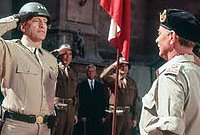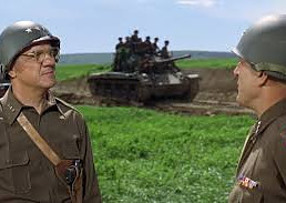Pearl-handled revolvers, riding britches, a highly polished helmet and the odd swear word were just some facets of George S. Patton’s persona. Nicknamed, ‘Old Blood and Guts’ he was respected and admired by friend and foe alike, even though one of the soldiers who served under him, Eugene W Luciano, named his memoir after a line from the film, (As an Amazon Associate I earn from qualifying purchases) ‘Our Blood and His Guts: Memoirs of one of General Patton’s combat soldiers.’ 
The screenplay for this film, written by Francis Ford Coppola and Edmund H. North, was based on two books: Ladislas Farago’s Patton: Ordeal and Triumph and General Omar Bradley’s memoir, A Soldiers Story. Bradley was also an advisor for the film. As far as telling the story as it was written, this film does a good job.
Patton 1970
Though the Great Escape was a particularly famous failure, Patton considers a highly successful American officer, George S. Patton (George C. Scott). The film is significant because it dramatically highlights the continued effects of politics on the film industry and how it occurs on several different levels. It shows that, even at the end of the 1960s, war films continued to be used as a positive propaganda tool. In this way, Patton replicates the similar premise behind Lawrence Oliver’s production of Henry V in 1944.
It utilises a successful conflict and commander to boost the low morale of America because of its [not so successful] involvement in Vietnam. The film is remarkable because it hardly considers the real enemy of the conflict, Germany, at all; most of Patton’s hatred is aimed at the Communist Soviet Union and communism in general. The choice of producing a biopic of Patton at this time was particularly inspired, as his hatred of the Soviets and Communism was renowned.
Iconic opening scene
The film begins with Patton’s arrival at a new divisional command in the North African desert in the winter of 1942 and continues to the end of hostilities in Europe in 1945. It deals with his life during the campaigns in North Africa, Sicily, France, and the Ardennes, including such low points as when he was removed from command due to striking a shell-shocked soldier. The film follows the enigmatic, forthright, and arrogant Patton as he fights the Germans, his superiors and his nemesis, Field Marshall, Sir Bernard Law Montgomery (Michael Bates). 
The opening scene, Patton’s speech to his assembled troops, highlights the film as a piece of propaganda. The giant Stars and Stripes draped behind him as he speaks dwarfs Patton, resplendent in uniform and pearl-handled revolvers. The speech is aimed not at the assembled troops but rather at the audience, an American public reeling from the after-effects of the 1969 Tet Offensive and the decline in feelings of US Military invincibility, student unrest and racial tensions. Domestically, America was in turmoil and Patton’s speech is reminiscent of a typical Shakespearian-inspired wartime speech by Churchill:
“Americans play to win all the time. That’s why Americans have never lost and will never lose a war because the very thought of losing is hateful to Americans. Now an army is a team, it lives, eats, sleeps, and fights as a team. This individuality stuff is a bunch of crap.”
The Vietnam Effect
The rhetoric attempts to refute Walter Cronkite’s news report from the grounds of the Saigon Embassy where he claimed that America had lost the war in Vietnam. This cynical attempt to portray a heroic war had become wearisome to a nation daily witnessing the horrors of a real war on television.
The inclusion of the striking incident is significant here because it represents the fact that no matter how bad a situation becomes it is still possible for the determined to achieve success as Patton eventually did. This message, though portrayed more subtly than in the Green Berets produced at around the same time, comes more convincingly in Patton because it is based on a real character.
Patton is also significant because it shows elements of progression towards more realistic dialogue with Patton’s speech uncensored [allegedly – depending on which sources you read] including the words ‘goddam’ and ‘crap’, the type of language that had been condemned three years before by the film censor.
However, the film maintains several themes that reflect the earlier period of films discussed. For example, the plight of the private soldier is all but ignored as the focus rests on the general. This imbalance is compounded since Patton placed his quest for personal glory above the well-being of his men. This situation is highlighted by his competition with Montgomery over who would seize Palermo first and observations made by General Omar Bradley (Karl Madden).
Omar Bradley’s view
Though the fact that he was an advisor throughout the film, Bradley is the voice of reason acting as Patton’s conscience. The film attempts to be more sophisticated than typical propaganda films.  During Patton’s attacks on Sicily, many of Patton’s men were killed but he insisted that the attack continued regardless of losses. At this point in the film, Bradley reminds Patton that: “The ordinary combat soldier doesn’t share in your dreams of glory, he’s stuck here. He’s stuck living out every day, day to day with death tugging at his elbow.” This highlights that even in the late 1960s, attitudes were changing.
During Patton’s attacks on Sicily, many of Patton’s men were killed but he insisted that the attack continued regardless of losses. At this point in the film, Bradley reminds Patton that: “The ordinary combat soldier doesn’t share in your dreams of glory, he’s stuck here. He’s stuck living out every day, day to day with death tugging at his elbow.” This highlights that even in the late 1960s, attitudes were changing.
Though strongly influenced by pro-war propaganda, the film does not exclusively deal with such propaganda. Bradley’s character infuses an anti-war element to a degree but also highlights the plight of the common soldier, which is a point of view more representative of the latter era of films under consideration here.
More work to do
This film won multiple awards, including Oscars for Best Picture, Best Actor, Best Director, and Best Original Screenplay. It is a film I am going to return to watch again as I probably have not seen it since I first wrote about it. My original critique of Patton needs some updating too (as do all of my reviews), one day, one day.
The next film in the sequence is another biopic but this time it’s one of Patton’s adversaries, no not Monty but Rommel.
all the best
BigT
